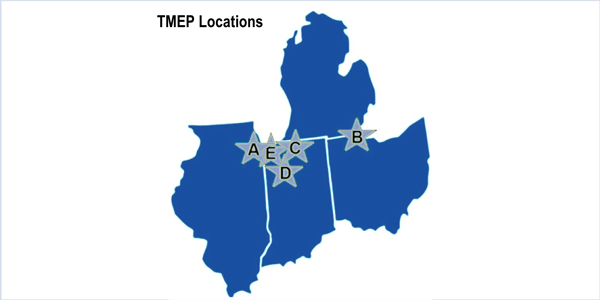By Amanda Durish Cook
FERC last week rejected state and local regulators’ rehearing request over MISO’s plan to include its South region in cost sharing for its new category of interregional projects with PJM.
The commission on Monday said it was not convinced by the regulators’ reasoning for rehearing MISO’s planned regional cost allocation on its targeted market efficiency projects (TMEPs), a new, smaller breed of interregional project developed with PJM that targets historical congestion along the RTOs’ seams (ER17-2246-002).
All based in MISO South, the regulators — the Arkansas, Louisiana and Mississippi public service commissions; New Orleans City Council; and the Public Utility Commission of Texas — argued that the RTO’s filing was flawed because it had not named a termination date of the TMEP regional cost-sharing proposal when Entergy’s five-year transition period that limits cost-sharing in the region ends in December.
By that time, MISO has promised to have a comprehensive post-transition period cost allocation proposal filed with FERC. The RTO has been working with stakeholders on a preliminary proposal that would make cost sharing available to 100-kV projects along the PJM and SPP seams but limit it to internal market efficiency projects of 230 kV and above. (See Stakeholders Debate MISO Cost Allocation Plan.)
The regulators wanted assurances that MISO’s TMEP regional cost-sharing plan would not apply beyond the transition period or to MISO South. When it approved the plan late last year, FERC said that if MISO does not have a cost allocation plan readied as promised, the regional TMEP cost allocation would continue to be in effect even after the transition period expires. The RTO proposed to assign its regional share of the costs of TMEPs to transmission pricing zones based on their historical contribution to the market-to-market congestion relieved by the project.
The regulators said FERC’s decision improperly modified MISO’s proposal, citing the D.C. Circuit Court of Appeals’ 2017 ruling that the commission overstepped its authority in prescribing revisions to PJM’s minimum offer price rule. (See On Remand, FERC Rejects PJM MOPR Compromise.)
However, FERC said the MISO South regulators did not have a case for rehearing because they could not prove its decision had caused a concrete injury, or “aggrievement.” TMEP costs could be assigned to MISO South once the transition period expires, FERC acknowledged, but it also said that it was not clear a “mere potential for future harm” is substantial enough to amount to aggrievement.
FERC also said MISO has already outlined a plan for if it does not follow through on a finalized comprehensive cost allocation. In that case, certain projects included in the annual Transmission Expansion Plan, including TMEPs, will be subject to the RTO’s existing cost allocation Tariff language.
“Commission precedent is clear: In the event of a conflict between pleadings and proposed tariff language, the tariff language controls,” FERC said.
The commission also disagreed with the regulators’ contention that by specifying that MISO’s plan could continue past the transition period expiration, it “transform[ed] the proposal into an entirely new rate of FERC’s own making.” It noted that MISO has committed to filing a new regional cost-sharing method for assigning MISO’s share of the costs of TMEPs prior to the end of the transition period.
“While we understand MISO South regulators’ desire for certainty regarding future assignment of MISO’s share of the costs of TMEPs, MISO has provided no indication that it intends to deviate from the commitment in its pleadings to convene stakeholder proceedings to develop a post-transition period proposal,” FERC said.
MISO and PJM’s TMEP portfolio, approved last year, comprises five congestion-relieving interregional upgrades to existing systems in Illinois, Indiana, Michigan and Ohio. The projects, which have individual $20 million cost caps, will coincidentally cost $20 million combined. On average, the projects’ costs will be allocated 69% to PJM and 31% to MISO, based on projected benefits, which are expected to reach $100 million. (See FERC Conditionally OKs MISO-PJM Targeted Project Plan.)





